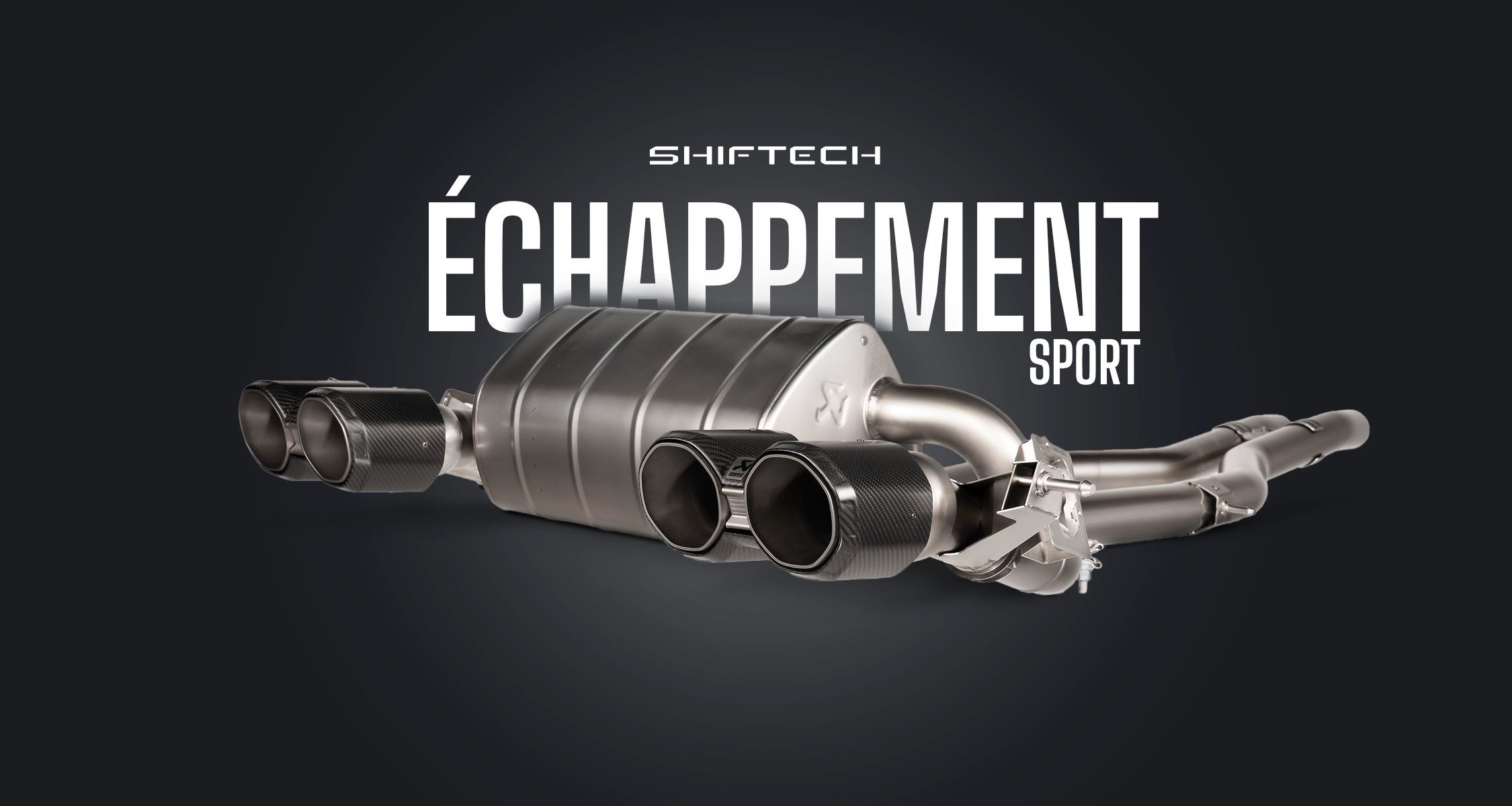
Sports exhaust system: Enhancing your vehicle's performance
The exhaust system plays an essential role in the smooth running of a vehicle. It channels and exhausts the combustion gases produced by the engine, which is generally located at the front of the vehicle. Thanks to the exhaust system, the gases are conducted to the rear of the car before being released outside.
This system goes beyond the simple notion of an exhaust duct. Made up of various components, it captures the gases as they leave the cylinders, reduces engine noise and treats the emissions to reduce pollutants. Not only does it help to direct the gases, it is also equipped with lambda probes to optimise engine combustion.
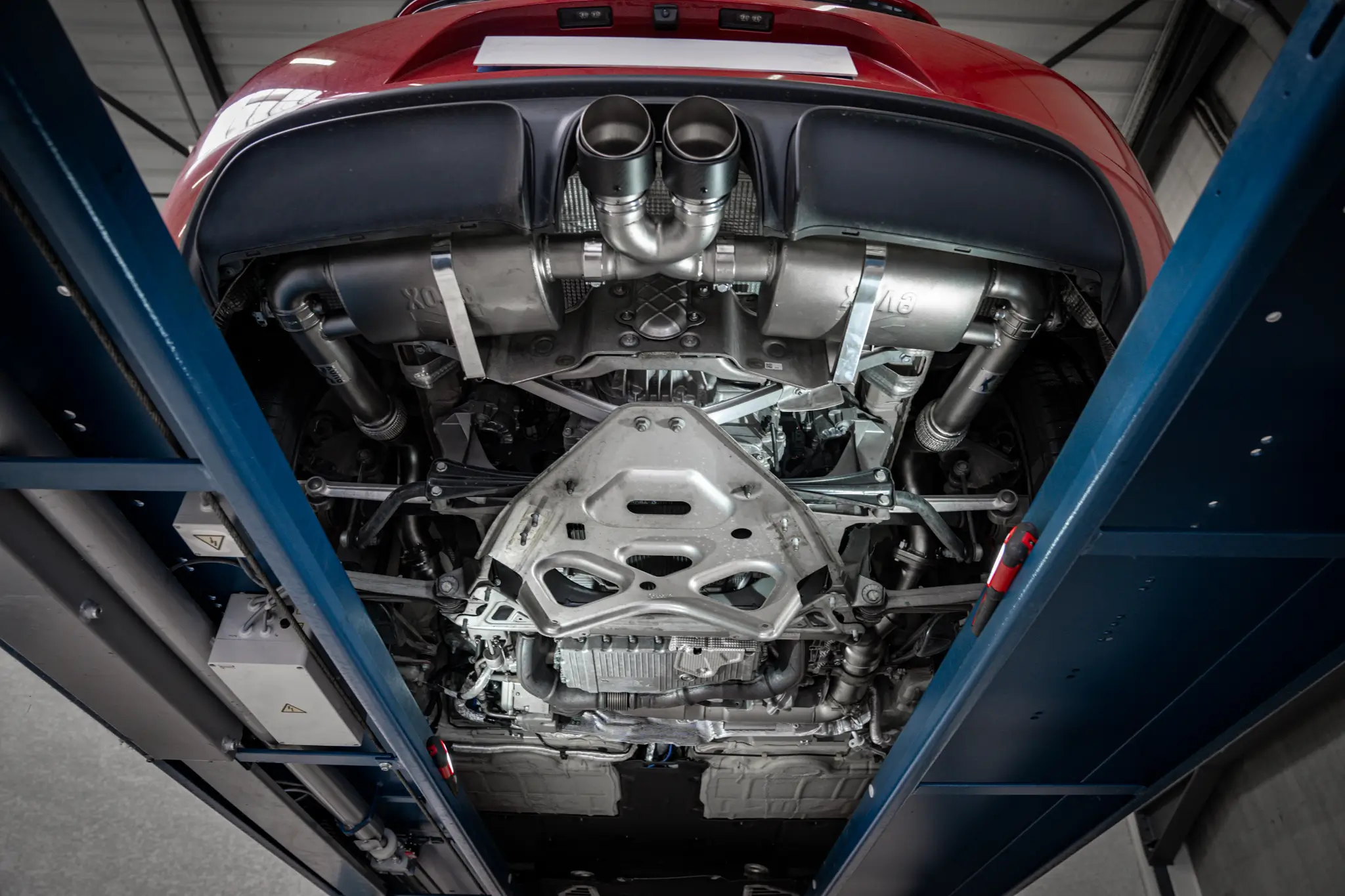
How does a vehicle's exhaust system work?
The manifold collects the gases, attenuating the noise and directing the flow. If the vehicle is fitted with a turbo, the gases pass through it before reaching the tailpipe. There, they are treated by anti-pollution devices such as the catalytic converter and the DPFS. These devices vary according to the type of engine and the year of the vehicle. The gases then pass through an intermediate silencer, before finally being discharged through the rear silencer and its tailpipes. As a result, the exhaust gases emerge with less noise and fewer fine particles, thanks to the anti-pollution devices and silencers.
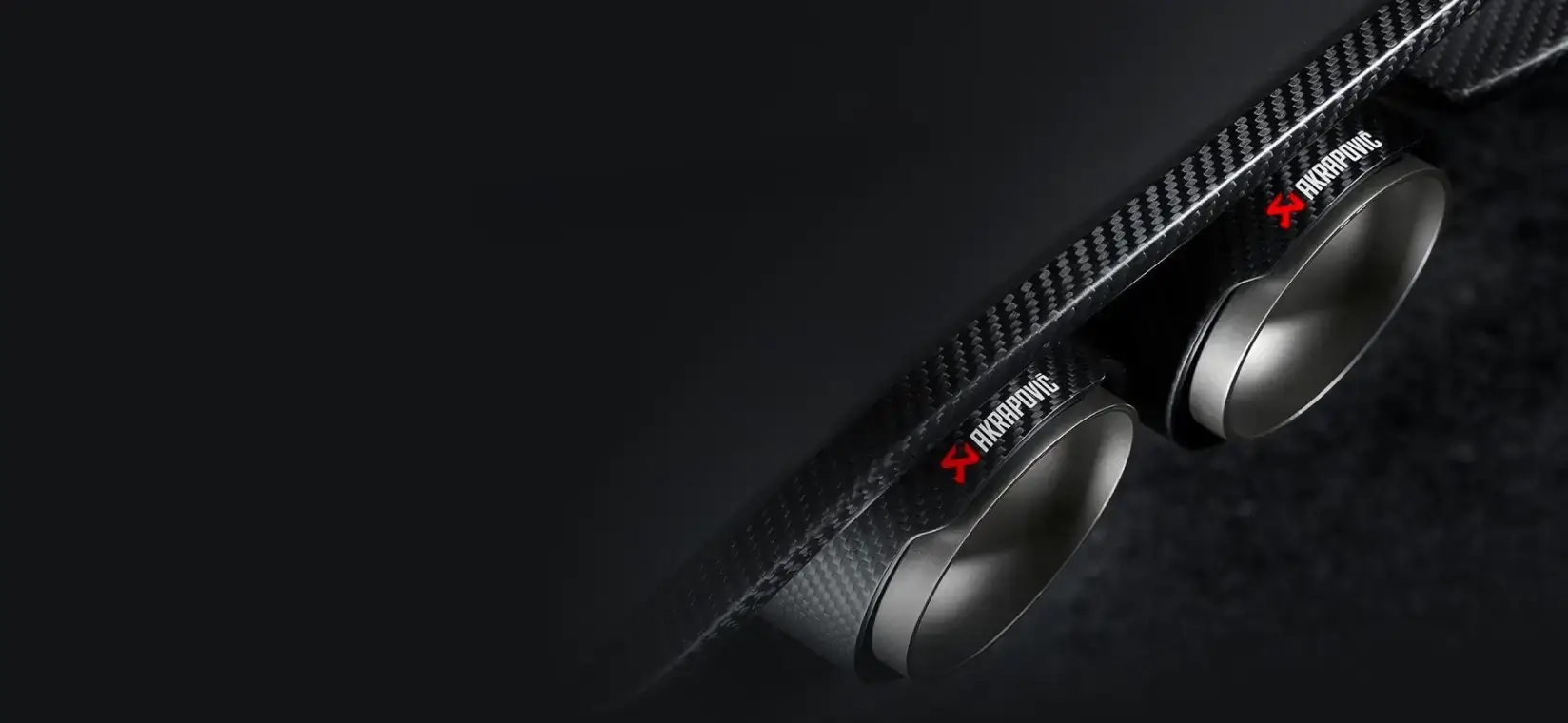
Why change your exhaust system?
When a vehicle leaves the factory, it is designed to comply with standards and meet customers' growing desire for noise discretion. However, this approach comes at the expense of performance and driving pleasure.
When it comes to the original exhaust system, it is mainly designed according to the engine's base power. If, however, you want to boost your vehicle's performance, as in the case of engine tuning, you will quickly reach the limits of this original line.
That's where optimisation comes in, with three major areas to consider: sound, performance and aesthetics.
Optimised exhaust flow for greater performance
Choosing a less restrictive sports exhaust system offers a clear improvement in engine performance. A more direct exhaust outlet and an optimised sports silencer boost your vehicle's power by reducing back pressure.
In other words, the speed with which exhaust gases are evacuated has a direct impact on the volume of fresh air that the engine can absorb (with or without a turbocharger), maximising its power.
Optimised exhaust evacuation means better sound and more power.
To achieve this perfect balance, sports exhaust manufacturers are working to reduce obstructions to facilitate gas evacuation, adjust the diameter of pipes and minimise baffles in silencers.
More sound for more pleasure
In addition to performance, a sports exhaust system also changes the sound signature of your vehicle. A more direct exhaust line, with minimal obstruction, lets out a more powerful sound, giving your vehicle a more distinctive and distinctive tone.
However, each sports exhaust system has its own sound identity. Different manufacturers play with combinations of pipes and silencers to create unique sounds.
Aesthetics for a personalised line
Installing sports exhaust tips gives your vehicle a much sportier look. Whether the tailpipes are made of stainless steel, carbon, blued titanium or matt black, this modification will catch the eye of connoisseurs.
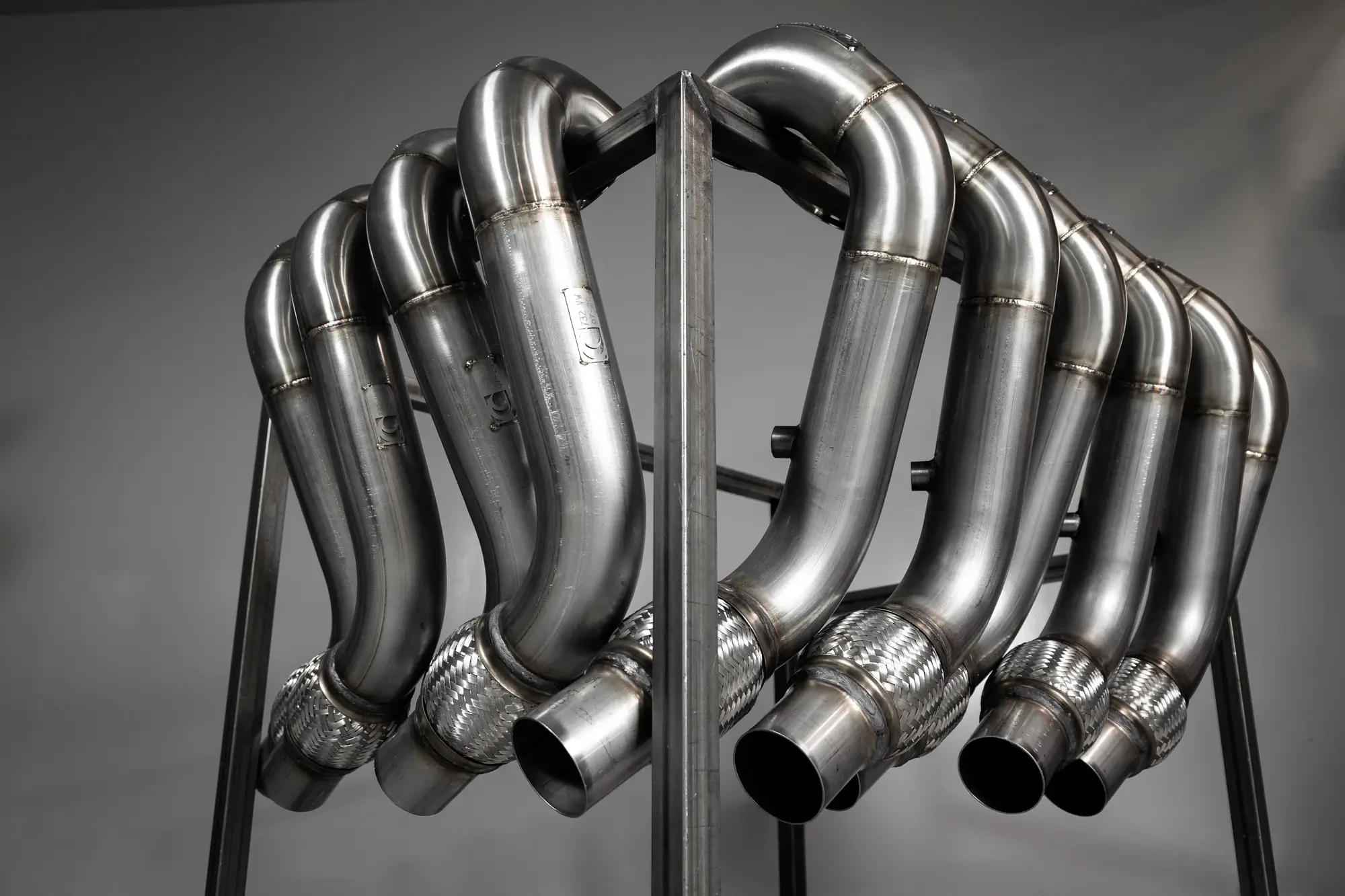
How do you modify your exhaust system: half line, downpipe or full line?
Optimising the exhaust system offers a wide range of options for every owner, from basic adjustments to complete transformations. Here's everything you need to know to make your car sing the way you want it to.
The basic principle to remember is simple: the freer the flow of gases, the greater the gain in power and sound.
Half-line modification (after catalytic converter)
Our work will focus mainly on the exhaust half-line, also known as the cat-back section (post-catalyser), while preserving the original anti-pollution devices.
This process may involve modifying or even removing the existing silencers, depending on whether they are resonated or non-resonated. By replacing them with a less restrictive tube or sports silencer, only the sound is altered, without affecting your vehicle's performance or emissions.
Downpipe modification
The real obstacle to optimum performance and sound is often caused by the original catalytic converter or DPFS. By opting for a less restrictive performance part, you can improve both sound and power. It should be noted that any modification to the downpipe or turbo downpipe requires appropriate stage 2 reprogramming.
HJS sports catalytic converter, the weapon of choice
To pass the anti-pollution tests while maintaining optimum back pressure for the engine, we recommend installing a CE-approved HJS sports catalytic converter (200 cells). It's an expensive device, but it allows you to stay within current standards while freeing up the performance of your sports exhaust.
Decat or Défap, a risk not to be neglected
Finally, there is the risky option of completely removing the catalytic converter or the DPFS by fitting an empty pipe, also known as a downpipe. Your vehicle will then no longer comply with roadworthiness or technical inspections and should be used exclusively on racetracks.
Complete line, hello performance
The ultimate evolution is the complete replacement of the exhaust system to increase the diameter of the tube and maximise flow. This complete sports exhaust system is coupled with the replacement of the downpipe with a performance part such as an HJS sports catalytic converter or a downpipe. This configuration is generally used to obtain major power gains, particularly during Stage 3 preparation.
What material should you choose for a sports exhaust system: stainless steel, titanium or Inconel?
It is essential to understand the differences between these materials in order to choose the one that is best suited to your vehicle. Exhaust systems are designed to evacuate the exhaust gases produced by the engine, thereby improving its performance. The choice of material for the exhaust system therefore has a major impact on this improvement.
stainless steel exhaust
T304 stainless steel exhaust systems stand out for their corrosion resistance and light weight. What's more, they offer excellent value for money, making them an interesting choice for improving your vehicle's performance without blowing your budget. Stainless steel also makes for a sportier sound and better engine efficiency.
exhaust Titanium
Titanium is the top-of-the-range material when it comes to exhaust systems. It is exceptionally light and highly resistant to heat and corrosion. Titanium also offers a unique sound, making it the perfect material for those seeking performance and sound. It is, however, much more expensive than stainless steel or steel.
exhaust Inconel
Inconel is widely used in the aerospace industry to manufacture components requiring unfailing strength and maximum thermal resistance. This material is used in the design of exhaust systems for Formula 1 and hypercars, where it is particularly used for its lightness and high strength.this material is used in the design of exhaust systems for Formula 1 and hypercars, where it is used in particular for its lightness and great strength, especially when the temperatures of the gases to be evacuated frequently exceed 1000°C.
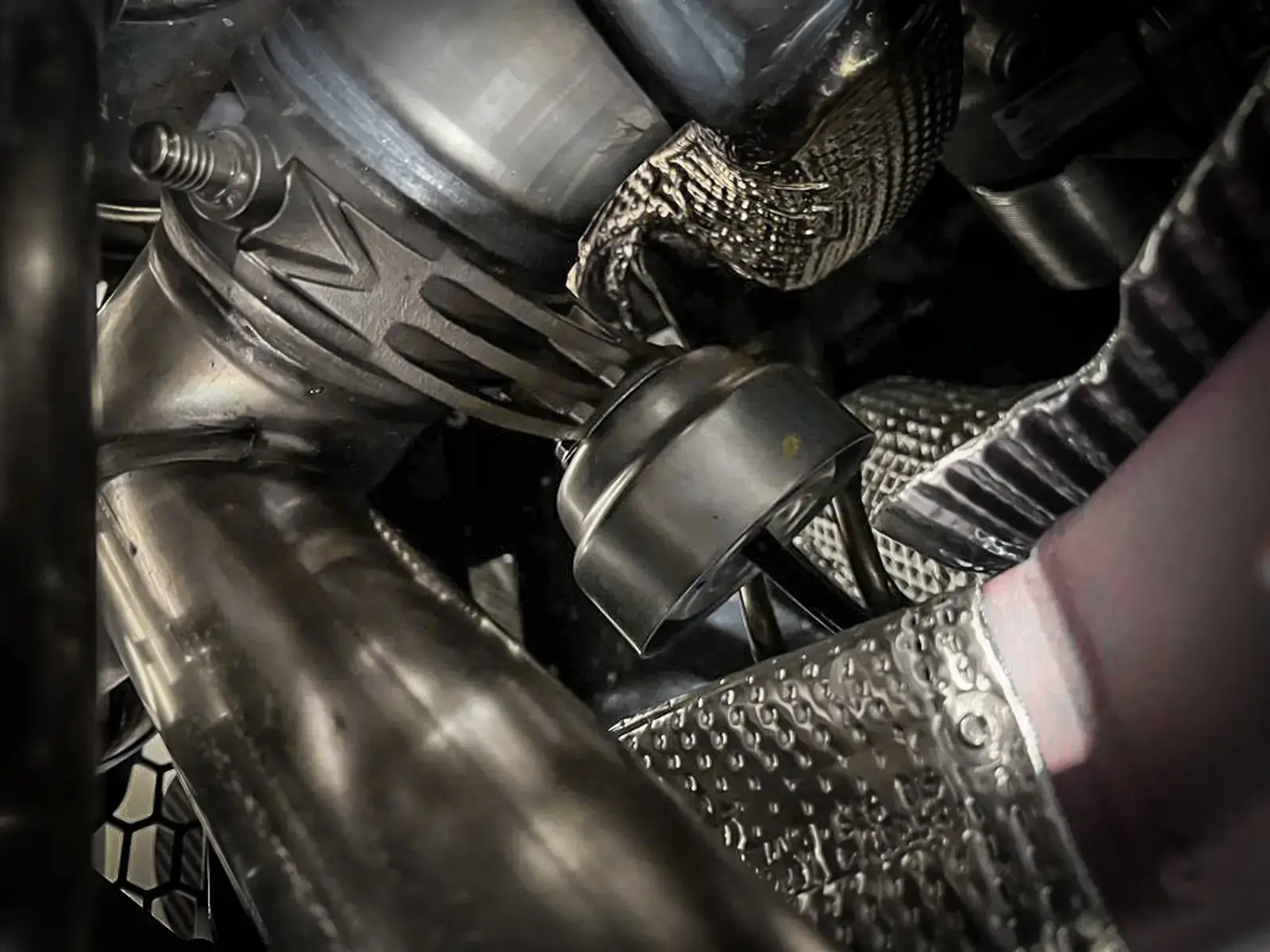
Valve exhaust system: advantages and sound modulation
Opting for an exhaust system fitted with valves offers a number of advantages. Exhaust valves, also known as exhaust flaps, control the flow of gases, allowing you to modulate the sound of your vehicle to suit your preferences.
In the closed position, the valve reduces the noise emitted by the exhaust, while in the open position it releases the gases more freely, enhancing the sporty sound.
The system can be controlled either by the driving mode (sport, comfort, etc.) or by a remote control that allows you to open and close the valves as you wish.
We also install our own original exhaust valve management system, the valve module controller by ShifTech. It fits onto the vehicle's original wiring harness, without any major modifications, and allows you to freely choose the opening and closing of the exhaust valves with a simple press of the remote control.
Which brand of exhaust system should I choose?
There are several leading brands in the field of sports exhausts, including Milltek, Supersprint, Akrapovic, Ragazzon, Evox, IPE, Remus and Armytrix.
These different brands are able to offer sports exhausts compatible with many models of BMW, Audi, Volkswagen, Seat, Mercedes, Renault, Porsche, Peugeot, etc.
Certification and legality: what you need to know
In France, any modification to the exhaust system must comply with current regulations in order to pass roadworthiness tests and roadside inspections.
The main points of the regulations
- Compulsory EC type-approval: An EC type-approved sports exhaust system guarantees compliance with European standards. Without this approval, your vehicle may not pass the roadworthiness test, and you could be fined if you are stopped at a roadside inspection.
- Regulatory noise level: Legislation imposes maximum noise thresholds (generally 74 to 82 dB depending on the vehicle). An approved sports silencer complies with these limits while improving sound levels compared to the original.
- Anti-pollution devices: Removing the catalytic converter or the FAP (defap/decat) makes the vehicle non-compliant. To stay within the law while gaining in performance, we recommend fitting a CE-approved sports catalytic converter like the HJS models.
Our Shiftech recommendation
At Shiftech, we favour approved solutions that combine performance and compliance: HJS 200-cell sports catalytic converters (CE approved), approved sports silencers from Milltek, Supersprint and Akrapovic, and complete exhaust systems with Stage 2/3 preparation approval.
Need advice on the homologation of your project? Contact your nearest Shiftech centre for a personalised study.
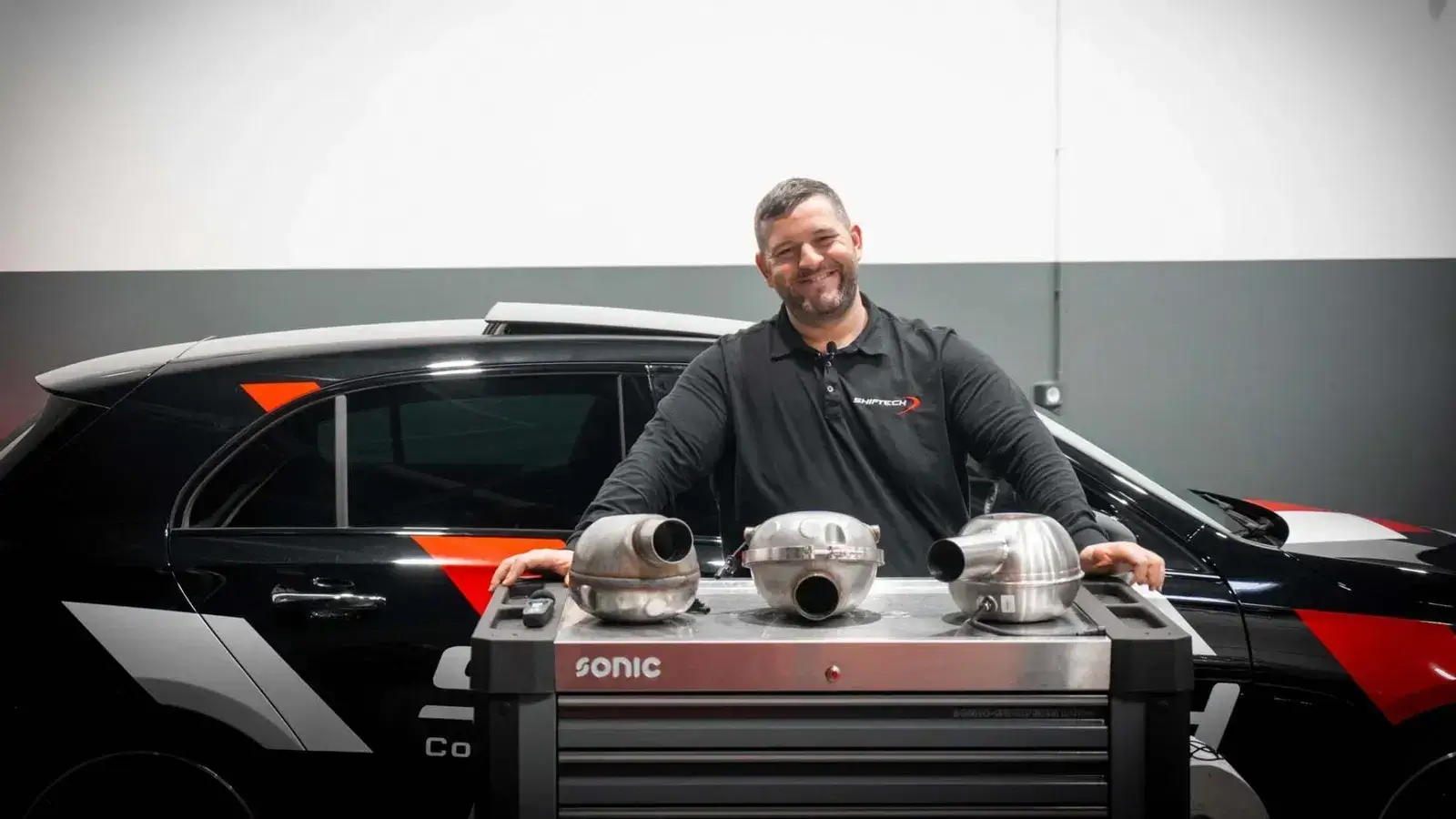
Bonus Option: The Active Sound System
There is another option that might surprise purists: the active sound system. This is a speaker protected in a stainless steel ball that reproduces the sound of sports engines in a realistic way. It can be adapted to both diesel and petrol vehicles without modifying the existing exhaust system.
Several car manufacturers, including BMW, Audi and Porsche, have already fitted it as standard on their models.